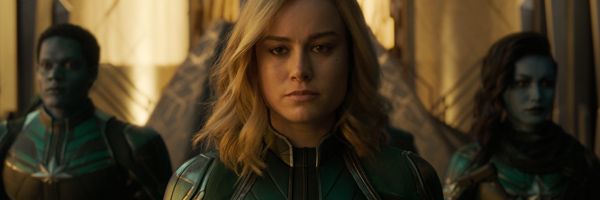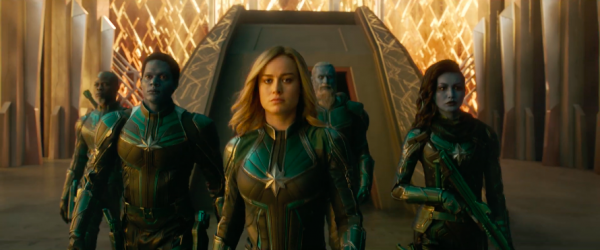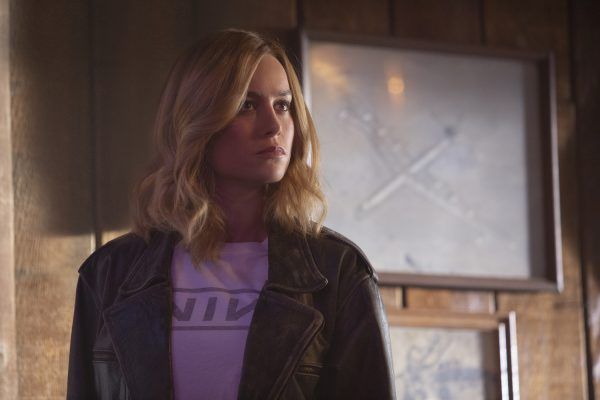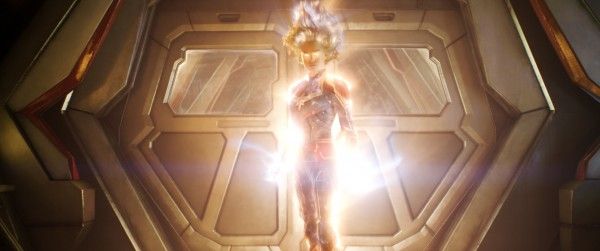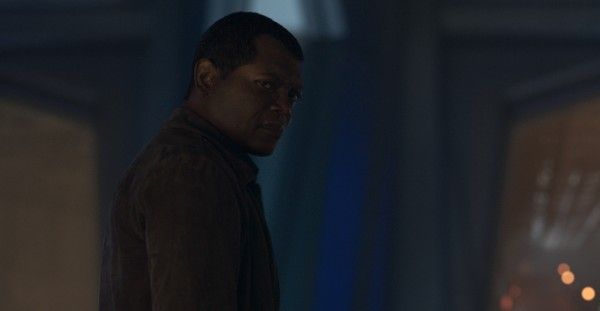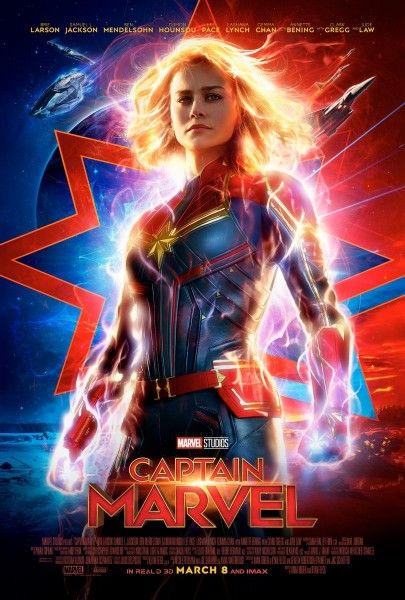If you look at every new Marvel superhero story as having to perform the one task of getting the audience to root for a performer playing a new hero, then Captain Marvel is a success. But it succeeds in the same way that Thor succeeded in that it has the right actor in the right role, but the surrounding film is burdened with poor visual and narrative choices you tend to overlook because you’re having fun with the character. Since the MCU depends on getting the audience to root for the characters since those superheroes will be reused in other movies, not just sequels, getting that aspect right is paramount, and Brie Larson makes Captain Marvel her own. It’s just a shame that co-writers and directors Anna Boden & Ryan Fleck’s film lacks the same bravado and that the script, in trying to wrap the origin story in a mystery, obscures what makes Captain Marvel unique and endearing.
“Vers” a.k.a. Captain Marvel (Larson) is a member of the Kree Starforce fighting against the shapeshifting Skrulls in an intergalactic war. A Skrull ambush leads to Vers getting separated from her fellow Kree fighters, led by her mentor Yon-Rogg (Jude Law), and eventually crash-landing on Earth in the year 1995. On the run from the Skrull, who are led by Talos (Ben Mendelsohn), Vers eventually teams up with a young Nick Fury (a convincingly digitally-de-aged Samuel L. Jackson) and the two search for Dr. Wendy Lawson (Annette Bening), a scientist whose work may not only end the Kree-Skrull War, but hold the key to Vers’ past, which she can’t remember since waking up on the Kree planet Hala six years ago.
The Captain Marvel marketing has been incredibly strange because it conceals one of the film’s strongest aspects, which is Captain Marvel’s personality. Although she’s not the first cocky Marvel superhero, she’s the first one with an attitude that feels earned. Guys like Tony Stark, Star-Lord, Thor, and Doctor Strange all have some level of power. Their movies get comic mileage contrasting their arrogance against their occasional shortcomings, and narrative catharsis when they are humbled and learn A Very Important Lesson about sacrifice. By comparison, Captain Marvel’s bravado feels earned, a result of a woman who’s had to work twice as hard for everything she’s ever received and never backed down from a challenge. She’s funny, whip-smart, and takes no crap. She’s a character you want to root for because her attitude feels incredibly human and relatable against her cosmic origin and backdrop.
Larson, unsurprisingly, is magnificent in the role. The young Oscar-winner’s talent comes as no shock, but she still leaves a stamp on the character that takes full ownership of where Captain Marvel goes from here. Just as Robert Downey Jr. defined Tony Stark and Chris Evans defined Steve Rogers, Larson has now defined Captain Marvel, a tricky task given the character’s confusing comic backstory. There’s nothing so simple as a super soldier serum of a fortuitous spider-bite. There’s a lot more narrative baggage, but Larson’s performance always keeps us on her side.
That personality becomes absolutely essential in a movie that doesn’t really know how to tell Captain Marvel’s origin story. On the one hand, I sympathize with the three credited screenwriters and the five writers credited with the story. Origin stories can be a lot of exposition, and we’ve seen them done to death. What Boden, Fleck, and co-writer Geneva Robertson-Dworet have done here to try and spice things up is give Vers’ amnesia so that she doesn’t even know her real name let alone where she came from. This way the audience is discovering Vers’ origin alongside her. Unfortunately, that approach leads to other characters telling Captain Marvel who she is, and every time it has to lapse into reveals, it loses sight of her personality. The mystery of her origin is ultimately uninteresting, and it deprives Captain Marvel of a character arc or any notable weaknesses. She’s a superpowered person who doesn’t know her past, discovers her past, remembers her strength, and becomes even more superpowered as a result.
On the one hand, it’s a thrill to see a female superpower with god-like powers. I enjoyed it in 2017 with Wonder Woman and I enjoy it now with Captain Marvel. But interesting characters have flaws and foibles, and Captain Marvel seems afraid to give its title character anything that could be perceived as weakness. This in turn, deprives Captain Marvel of some of her humanity and the shading that other superheroes receive. Even Captain America, a totally moral boy scout gets the shading of giving up a chance at happiness in order to save the world. Thematically, there’s a bit of growth in Captain Marvel’s story with regards to her relationship to Yon-Rogg, but it gets overshadowed by the basic and bland character development.
There are some interesting themes bubbling beneath the surface (to specify would spoil major story turns), and I look forward to the discussion and analysis (particularly from women) about what qualifies as a “Strong Female Character” and if the trade-off here—denying Vers relatable human weaknesses in exchange for just watching her kick total ass—is worth it. Sadly, there still aren’t that many female-led superhero movies, and so Captain Marvel is finding the path by walking it. For me, I like the idea of Captain Marvel presented here, but when I look at the nuts and bolts of her story, I find it lacking.
Boden & Fleck further diminish their story by showing an utter lack of imagination in bringing Captain Marvel’s world to life. If you ever wanted to see what Guardians of the Galaxy would look like without James Gunn’s personality, Captain Marvel is your answer. Vers is on a Kree team, but you’ll never get to know any of them outside her, Yon-Rogg, and Korath (Djimon Hounsou), who you only know because he was in Guardians of the Galaxy as Ronan’s (Lee Pace) henchman. When the action takes place on Earth, it’s fine, but largely “I Love the 90s” with a fun soundtrack and various decade-specific references. But the cinematography is some of the worst yet in a Marvel movie, especially after visually rich entries like Thor: Ragnarok and Guardians of the Galaxy, Vol. 2. In a third act climax that goes on for far too long, one of the set pieces is inexplicably a fight in a darkened hangar, and not only is the set piece poorly staged, you can’t really see it in the first place.
And yet I can’t say that the story miscalculations or flat direction ever derailed the film because I was so invested in Captain Marvel, especially once she teams up with Fury. Although this Fury is a far cry from the cloak-and-dagger spy we’ve seen in previous Marvel movies, it doesn’t really matter because it’s so much fun watching Larson and Jackson bounce off each other. When Captain Marvel settles into the groove of a buddy movie, it’s an absolutely joy, especially when Mendelsohn comes along to steal every scene that he’s in. Once you throw in the friendship between Captain Marvel and her fellow pilot Maria Rambeau (Lashana Lynch), you’ve got a film where the characters are doing the heavy lifting and you’re invested in their actions even if the story beats feel staid and the visuals lack swagger.
Taken on its own merits, Captain Marvel comes up short as a superhero origin story. By trying to find a fresh approach, the screenplay deprives its lead character of an arc and some of her humanity. The film itself lacks the energy and vision of Black Panther or even Captain America: The First Avenger. But when it comes to making you root for its superhero and eager to see her in more Marvel movies, Captain Marvel passes with flying colors.
Rating: B-

